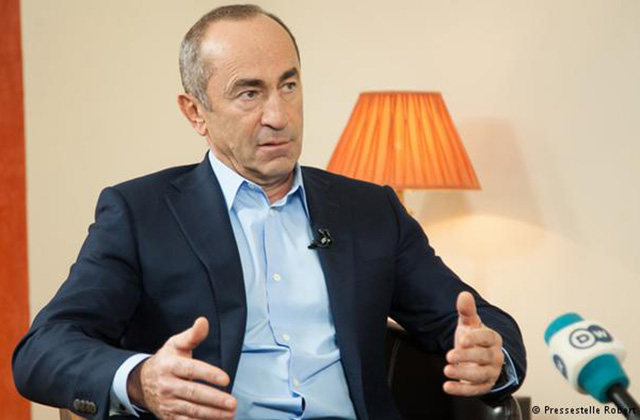It turned out, everything is much more complicated in the reality: Robert Kocharyan

Interview of 2rd.am with Robert Kocharyan, RA second president.
Mr. president, unfortunately, up to now the authorities didn’t introduce clear snapshot of occurrences and implications of the April war to the society. At a certain moment officials seemed to provide more or less objective information, however, after that the media was filled with hurrah-patriotic propaganda. As usual, lots of rumors were being circulated, sometimes incredible ones, but anyway, bearing negative character. Actually what happened from military and political perspective? Do you consider implications of the April war catastrophic? Was it a victory or a defeat?
Lack of reliable information has always generated rumors, and, as a rule, negative ones. Obviously, there was no sense in distortion of the occurrence, moreover, it’s practically impossible to hide the truth within our country.
The continuous increase of the military potential and bellicose rhetoric of Baku developed into practical steps, switching from sabotage attack to military settlement of the problem. Probably, Azerbaijan underestimated the combat readiness of the NKR Defense Army, as well as high preparedness of the population of Karabakh and Armenia to resist aggression. Apparently, price for the unleashed military operation and its growing scale became unacceptable to Baku and the war was stopped.
I would not qualify the developments as a victory or defeat. Azerbaijani troops have taken several Armenian positions, but failed to settle a single strategic military task. Baku’s euphoria of military victory is absolutely groundless. We have failed to retrieve the territories. This inspires no optimism, regardless of the loss size. In addition, human losses suffered within 4 days are unusually high and unacceptable to us. So, one should not talk about moral victory. However, it has become obvious that even amid the broken military balance, there is no easy military settlement to the conflict and that the frozen negotiations can really be boosted.
Is it possible to get prepared for a new possible war by calculation of new military success? Who’s guilty of the occurrence, for instance, that we have been technologically back regarding armaments?
War was short and the sides didn’t exhaust their potential, that’s why certain time wasn’t needed for recovery. The issues is, how soberly Azerbaijan will assess the occurrence and to which extent it’s ready for hard and lasting war. I think if Baku were ready in April, it wouldn’t have ended after 4 days.
The fact that Azerbaijani military hardware prevailed over ours was not a secret, but it is one thing to know it and quite another to face it on the battlefield. The regrettable point is that Armenia—a CSTO member country with a Russian military base on its territory—was considerably inferior to the adversary regarding armaments. The painful public response is clear here. Everyone wanted to believe that a military alliance with Russia ensures respect for the military balance and security of Armenia and Karabakh /before implementation of Baku-Moscow contract signed in 2011, the arms parity was observed/.
It turned out that everything is much more complicated in the reality. Escalation of the military conflict obviously is not favorable for Russia as it makes the latter choose between responsibilities of a mediator, Armenia’s military ally and striving for further rapprochement with Azerbaijan. Supply of up-to-date offensive weapons to Baku have broken the balance, significantly increasing the probability of this scenario. Why did it happen and could we escape from likewise developments? These questions are going to be topic for lasting discourses, suppositions and speculations. Armenia should have managed to stop the implementation of the contract or it should have at least limited the range of the armaments or synchronized it with similar supplies to Armenia. Arguments were more than enough here. I do not know how effectively the authorities tried to do it and why they failed to prevent it, therefore, I would refrain from assessments.
At the same time, we proved to be unprepared in terms of military equipment, purchase of which needed no intergovernmental agreements at all. For over two years the adversary’s army caused a lot of trouble at nights, because it was equipped with all necessary equipment. What prevented the Armenian side from equipping the army with sufficient night vision devices and other necessary equipment? It’s not normal when the commander manages war by a mobile phone, when there are no night target finders. All the gaps should be fulfilled and it’s clear, that operations towards it are ongoing.
There is need to immediately fill all the gaps and it is clear that measures are already being taken to that end. But this should be done at the institutional level, he said, noting that volunteers should not go to the front spontaneously but they should be sent to the military units with due regard for their military specialties. Fidayi [guerilla] movement of early 90s compensated weakness of young state institutions. However, on the 25th year of independence patriotic outbreak should be strengthened by competency and organizational potential of respective bodies. It’s simply possible to wage a war in other way.
Shouldn’t Armenia review its membership format to EEU and CSTO, as well as its relations with unions and alliances with some partners, for instance, with Belarus and Kazakhstan?
Activities by some CSTO member countries basically are inconsistent with our total membership in the military alliance. Obviously, we won’t change interests of those countries, however, we are obliged to draw serious conclusions. It’s worth clear understanding of what is CSTO and not to have overestimated expectations from that organization. CSTO is a symmetric structure, axis of which is Russia’s military-political interests with independent and separate linkage to interests of each country. Any common interest is not observed here. Where are our shared interests, for instance, with Kazakhstan or Kyrgyzstan? One should be naïve to consider that joint membership to CSTO may prevail relations of Kazakhstan developed with Turkey and Azerbaijan. For this very reason CSTO should be observed in the context of military-political and military-technical cooperation with Russia. This is the reality, and it can’t be ignored.

























